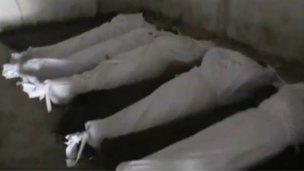New Syria 'mass killing' reported ahead of UN meeting
- Published

Activists have released a video which they say shows another mass killing of civilians by a pro-government militia in Syria - the third in a week.
Thirteen factory workers were forced off a bus and executed by shabiha members in a village near Qusair, in the west of the country, they said.
Correspondents say the video shows a group of bodies with hideous injuries.
The UN Human Rights Council has meanwhile begun an emergency session to discuss the violence in Syria.
It is expected to blame pro-government forces for last week's massacre in Houla, in which more than 100 people died, including 49 children.
On Thursday, a Syrian government investigation into the killings blamed armed rebel groups seeking to trigger foreign military intervention.
The US permanent representative to the UN, Susan Rice, dismissed the finding as a "blatant lie", for which there was no factual evidence.
UN verification
On Thursday evening, activists posted on the internet two videos showing the bodies of the 13 men who they said had been killed in al-Buwaida al-Sharqiya, a village between Qusair and the city of Homs, earlier that day.
One video showed a group of bodies sprawled on the ground, with hideous injuries consistent with their having been shot dead at close range in the head or stomach, reports the BBC's Jim Muir in Beirut.
Another video showed the bodies laid out on the floor of a building, with relatives grieving over them, our correspondent adds.
Activists said the murdered men were workers from a fertiliser factory whose bus was intercepted by shabiha members. They first of all robbed the workers, then took them off the bus, forced them to chant pro-government slogans and executed them, the activists added.
The account cannot be independently verified, but twice in the past week, UN ceasefire observers on the ground have corroborated similar claims from activists - most recently the killing of 13 men in the eastern province of Deir al-Zour, and before that, the massacre in the Houla area of Homs province.
Residents of the village of Taldou said the shabiha had been sent into their village early on Saturday after the Syrian army unleashed a barrage of heavy weapons late on Friday in response to a local anti-government protest.
The UN Office of the High Commissioner for Human Rights said most of the 108 victims had been shot at close range or stabbed. No more than 20 had been killed by tank and artillery fire preceding the raid, it added.
'Wanton killings'
The UN Human Rights Council, the world's top human rights body, is meeting in emergency session to discuss Syria and is expected to condemn the Houla massacre in the strongest possible terms.
A draft resolution refers to "the wanton killings of civilians by shooting at close range and by severe physical abuse by pro-regime elements and a series of government artillery and tank shellings of a residential neighbourhood", and demands that Syria allow in human rights investigators and aid agencies immediately.
But the BBC's Imogen Foulkes in Geneva says the 47-member council has no real power. It cannot impose sanctions on Syria, neither can it order the UN Security Council to act.
And, our correspondent adds, with continued disagreement within the UN - neither Russia nor China supported the council meeting - and continued fighting in Syria, the prospect of an end to human rights violations, let alone the prosecution of those responsible, seems a very long way off.
Russian President Vladimir Putin is expected to face pressure over Syria from the leaders of Germany and France when he visits Berlin and Paris. Russia has blocked Security Council action against Syria's government.
UK Foreign Secretary William Hague is meanwhile scheduled to meet representatives of the Syrian opposition in Turkey.
Mr Hague told the BBC that the situation was so grave and deteriorating so rapidly that all options were still on the table.
He warned that military intervention would have to be on a much bigger scale than in Libya and have to have "very broad international support".